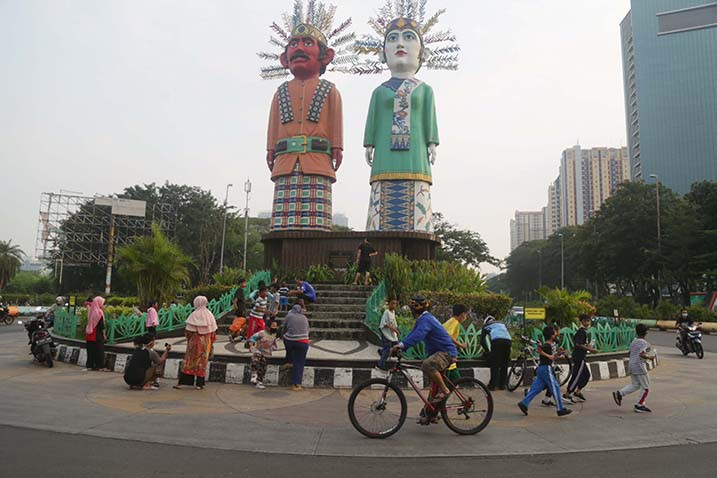Popular Reads
Top Results
Can't find what you're looking for?
View all search resultsPopular Reads
Top Results
Can't find what you're looking for?
View all search resultsJakarta extends transition phase, postponing further relaxation by 14 days
Change text size
Gift Premium Articles
to Anyone
 Move it: Residents exercise on Jl. Benyamin Sueb in North Jakarta during the Car Free Day event on Sunday. Although the street is one of 32 Car Free Day locations designated by the Jakarta administration to replace Jl. Sudirman and Jl. Thamrin, many motor vehicles were seen passing through, and no city workers were seen guarding the area. (JP/Wendra Ajistyatama)
Move it: Residents exercise on Jl. Benyamin Sueb in North Jakarta during the Car Free Day event on Sunday. Although the street is one of 32 Car Free Day locations designated by the Jakarta administration to replace Jl. Sudirman and Jl. Thamrin, many motor vehicles were seen passing through, and no city workers were seen guarding the area. (JP/Wendra Ajistyatama)
J
The city administration had decided to keep its large-scale social restrictions (PSBB) in place until July 15 after reviewing the situation of the pandemic in the capital with the COVID-19 task force, Anies said.
He highlighted the need for Jakarta to avoid a spike in infections once the administration started to relax curbs.
"[We] still need to improve the public's discipline in three important aspects, [namely] using face masks, washing hands regularly and maintaining a [physical] distance,” Anies said during a press conference live-streamed on Wednesday.
Jakarta had already extended for a third time its PSBB on June 4 until the end of last month, a period described as Jakarta's "transitional" phase to loosening restrictions, after research data showed that the epidemiological trend of new COVID-19 cases and deaths had declined.
On Wednesday, Anies claimed that Jakarta had achieved a score of 71 in the pandemic indicator designed by a team from the University of Indonesia’s (UI) Public Health department, slightly surpassing the advised minimum score of 70 for relaxing restrictions.
The index takes into account epidemiological conditions, public health and health facilities.
The capital had tested around 1,400 residents per 1 million population, exceeding the minimum of 1,000 tests per million people recommended by the World Health Organization (WHO), Anies said.
Anies said residents needed to be more disciplined in wearing face masks, washing their hands and maintaining a distance from one another to avoid a future spike in COVID-19 cases.
The city administration would also deploy military, police and administration officers to supervise the implementation of health protocol at traditional markets and on commuter trains, as those places had become hotbeds of transmission.
Officers would guard every entrance and exit of all 153 city-owned markets and 150 community markets in the capital and limit the number of visitors to 50 percent of the market’s capacity at any given time. In exchange, markets were allowed to return to their regular operating hours.
For the commuter trains, officers would cooperate with state-owned railway operator PT Kereta Commuter Indonesia (KCI) to supervise passenger limitations at stations.
“Transmissions in other places, such as office buildings, shopping centers and other public transportation services is pretty much under control, but work remains to be done at traditional markets and commuter trains,” Anies said.
Although the new school year is scheduled to start on July 13, Anies said Jakarta had no plans to reopen schools yet, with online learning expected to continue as the provincial health agency warned that children were more susceptible to infection.
The governor said the majority of COVID-19 cases in the capital were active, and many of the cases were asymptomatic residents found to be positive through door-to-door tests conducted by community health centers (Puskesmas) rather than hospitalized patients.
“[We will continue to] test, track and isolate [these patients],” he continued. “That way, we want Jakarta citizens to have confidence that the government is taking all steps to protect and guarantee the safety of its citizens.”









